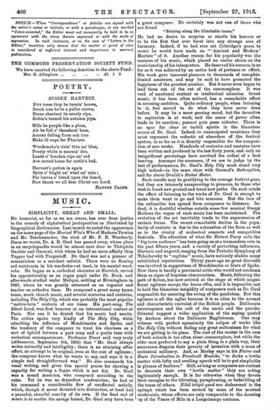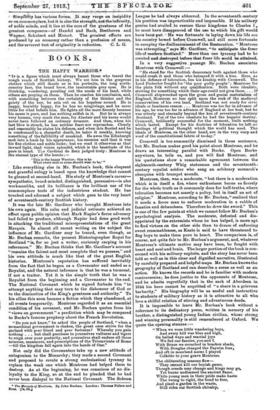MUSI C.
SIMPLICITY, GREAT AND SMALL.
No humorist, so far as we are aware, has ever done justice to the comedy of alphabetical juxtaposition as illustrated by biographical dictionaries. Last month we noted the appearance on the same page of the Musical Who's Who of Madame Ternina and Mr. Teschemacher, the rival of Mr. F. E. Weatherly. Since we wrote, Dr. A. R. Gaul has passed away, whose place in an encyclopaedia would be almost next door to Theophile Gautier and Gavarni, with whom be had no more affinity than Tupper bad with Turgenieff. Dr. Gaul was not a pioneer of romanticism or a mordant satirist. There were no flaming red waistcoats in his wardrobe—at least, in his mental ward- robe. He began as a cathedral chorister at Norwich, served his apprenticeship as an organ pupil under Dr. Buck, and afterwards studied under Molique, settling at Birmingham in 1869, where he was greatly esteemed as an organist and teacher on orthodox lines. He composed a great many hymn tunes, much church music, and several oratorios and cantatas, including The Holy City, which was probably the most popular "native-born" oratorio of our times. His part-song, The Silent Land, won first honours at an international contest at Paris. Nor can it be denied that his music had merits. The critics spoke very kindly of The Holy City, while admitting the influence of Mendelssobn and Spohr, and the tendency of the composer to treat his choruses as a sort of hybrid between a part song and a psalm tune with orchestral accompaniment. Professor Prout said very truly (Athenaeum, September 9th, 1882) that "Mr. Gaul always writes naturally and intelligibly ; there is no straining after effect, no attempt to be original, even at the cost of ugliness ; the composer knows what he wants to say, and says it in a simple and straightforward way." He also commends his vocal writing, and gives him special praise for showing a capacity for writing a fugue which is not dry. Dr. Gaul was a sound musician, who composed according to the rules. Yet he was no dryasdust academician; he had at his command a considerable flow of unaffected melody, which, though it never deviated into distinction, at least had a peaceful, cheerful suavity of its own. If the final end of music is to soothe the savage breast, Dr. Gaul may have been a great composer. He certainly was not one of those who are found "Ruining along the illimitable inane."
He had no desire to surprise or startle his hearers or to be the first that ever burst into any strange seas of harmony. Indeed, if he had ever set Coleridge's poem to music he would have made an "'Ancient and Modern' Mariner" of it. Another reason for his popularity was the easiness of his music, which placed no undue strain on the musicianship of his interpreters. He deserved his success, in so far as it was achieved by an entire lack of pretence or effort. His work gave innocent pleasure to thousands of unsophis- ticated amateurs, and may be said to have promoted the happiness of the greatest number. But it never even began to lead them out of the rut of the commonplace. it was void of emotional content or intellectual stimulus. Great music, it has been often noticed, has a remarkable effect in arousing ambition. Quite ordinary people, when listening to it, feel moved to do what they have never done before. It may be a mere passing mood, but the incentive to aspiration is at work, and the sense of power often leads to its exertion ; possunt quia posse videntur. There is no spur for clear or turbid spirits in the blameless scores of Dr. Gaul. Indeed, to emancipated musicians they must represent the reductio ad absurdum of the festival system, in so far as it is directly responsible for the composi- tion of new works. Hundreds of oratorios and cantatas have been written and produced in the last forty years, and only an insignificant percentage have survived the ordeal of a first hearing. Amongst the successes, if we are to judge by the test of performances, Dr. Gaul's Holy City must stand very high indeed—in the same class with Gounod's Redemption, and far above Dvoleik's Stabat Mater.
Such results may be gratifying to the average festival-goer, but they are intensely exasperating to pioneers, to those who wish to break new ground and tread new paths. On such minds the effect of listening to the works of Dr. Gaul is enough to make them want to go and bite someone. But the lure of the unfamiliar has spread from composers to listeners. In- deed, it is doubtful whether outside some few musical Sleepy Hollows the vogue of such music has been maintained. The evolution of the art inevitably tends to the supersession of certain forms. The recent remarkable decline in the popu larity of oratorio is due to the exhaustion of the form as well as to the rivalry of orchestral concerts and competitive festivals. The education of what Sir Hubert Parry calls the "big town audience" has been going on at a tremendous rate in the past fifteen years, and a variety of perturbing influences, Slavonic and negroid, ranging from the Pathetic Symphony of Tchaikovsky to "ragtime" music, have seriously shaken many established reputations. Thirty years ago no great discredit was involved in suggestions of Mendelssohn or hints of Spohr. Now there is hardly a provincial critic who would not condemn them as signs of hopeless obscurantism. Music, following the path of fiction, has now arrived at the stage at which magni- ficent ugliness usurps the beaux roles, and it is impossible not to hold the blameless insipidity of composers such as Dr. Gaul responsible for assisting the swing of the pendulum. But this ugliness is all the uglier because it is so alien to the normal and characteristic restraint of the British people. Deliberate extravagance and the cult of the exotic and the pseudo- Oriental suggest a wider application of the saying quoted by Ascham about the Italianate Englishman. One may witness with perfect equanimity the eclipse of works like The Holy City without feeling any great enthusiasm for what we are getting in its place. The root of the matter in the case of both schools is too often sheer commonplace, but while the older men preferred to say a plain thing in a plain way, their successors disguise their poverty of invention with a mass of orchestral millinery. And, as Morley says in his Plaine and Easie Introduction to Practical' Musicke, "to decke a lowlie matter with lofty and swelling speech will be to put simplicitie in plumes of feathers." Still, as long as composers are content to decorate their own " lowlie matter" they are acting legitimately enough. It is far otherwise when they devote their energies to the titivating, paraphrasing, or bedevilling of the tunes of others. Nihil tetigit quod non dedecoravit is the epitaph which has been earned by some of the musical modernists, whose efforts are only comparable to the dressing up of the Venus of Milo in a Longchamps costume. ; Simplleity has various forms. It may verge on insipidity or on commonplace, but it is also the strength, not the infirmity, of noble minds, and it lies at the tore of the greatness of the greatest composers—of Handel and Bach, Beethoven and Wagner, Schubert and Mozart. The greatest effects are produced by an economy' rather than a profusion of means, and the-severest test of originality is reduction. C. L. G.











































 Previous page
Previous page